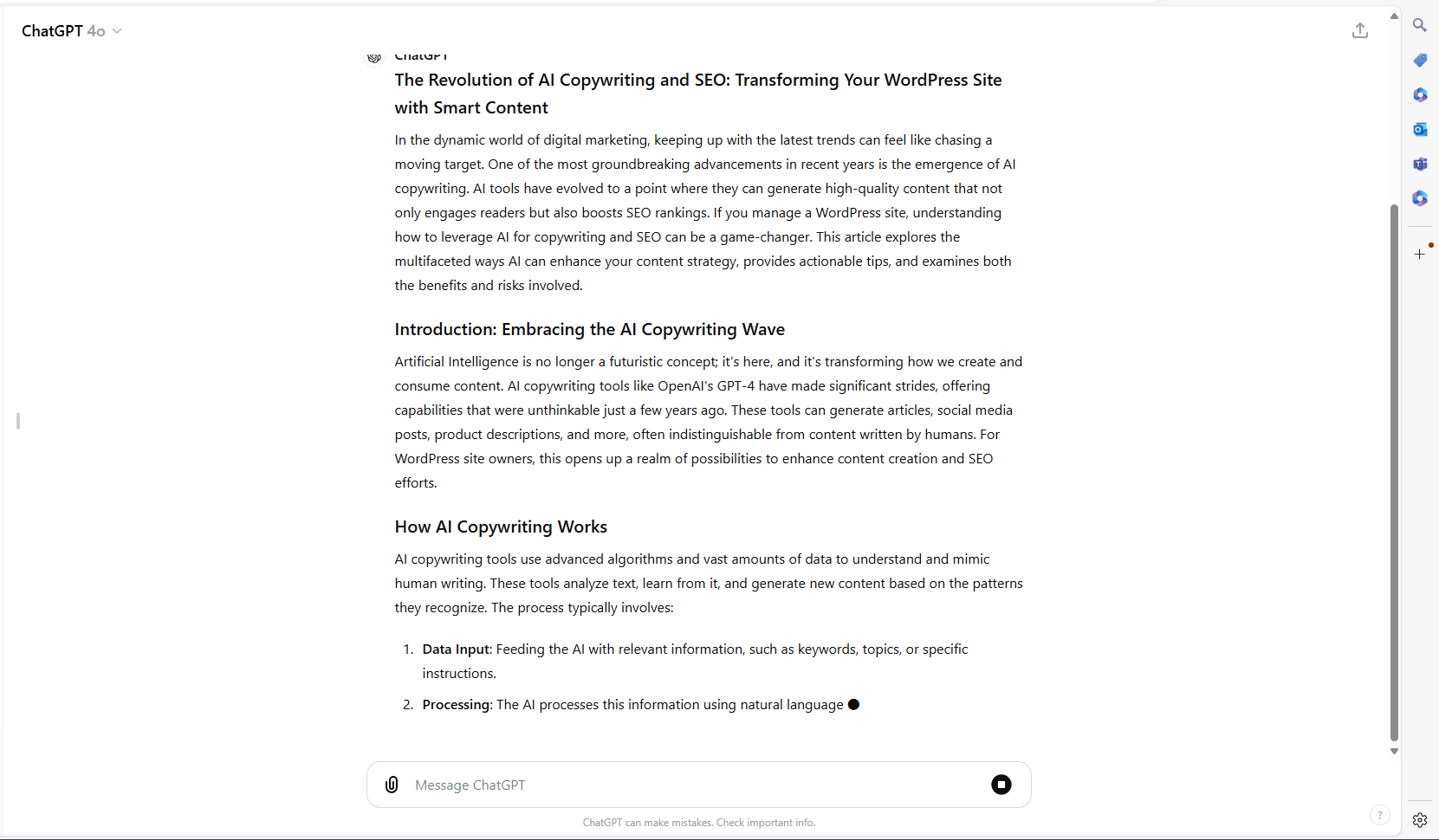Producing lots of content has often been promoted as a great SEO tactic. In our own guide SEO Success for WordPress with a Two-Hours-a-Week Routine we said, “You can gain a lot of advantages in SEO just by regularly producing new, relevant content on your website.” Now that it is easy for any website owner to create articles in seconds and at scale, it has thrown a spanner in the works. Google can no longer just reward sites for having lots of words (and this was probably never the case), it must now focus on the quality of text. In our opinion, AI must be used intelligently for it to help SEO.
What do we mean by SEO Copywriting?
We can define copywriting as writing copy / text for anything from magazine articles, blog posts, product descriptions, catchy ads to the blurb on cereal packets. We have defined SEO copywriting as writing copy for websites while aiming to please search engines. Normally SEO copywriting will be based on keywords. This includes writing text for SEO tags like the TITLE tag and the META Description tag. Sometimes an SEO copywriter is involved uniquely in a project to add SEO tags to existing pages.
The careers website Indeed, currently lists +100 SEO Copywriter jobs and indicates that the average salary in the US is $64,594. Increasingly, though, people searching “seo copyriter” on Google may be searching for software and not a human.
SEO copywriting tasks that AI can do
Typical copywriting tasks that website owners may want to use AI for include:
- Writing blog posts
- Writing landing pages
- Writing product pages for ecommerce
- Writing category pages for ecommerce
- Writing TITLE tags
- Writing META Description tags
More advanced SEO copywriting tasks could include keyword research, editorial planning and even determining and producing structured data schema for content. For example, Optimizing a Blog’s Recipe Pages with Schema. As we will discover in a later chapter, AI tools can do all of these tasks, but can they do them well enough to be trusted to not damage your SEO?

Is AI-generated content safe for SEO?
Google has long warned against mass-producing content automatically and they appear to have recently cracked down on AI-generated content through new ranking systems (Product Reviews and Helpful Content) and new spam policies. If you reproduce a lot of AI-generated content on your website without paying enough attention to quality, then you may be harming your SEO.
However, Google says that AI-generated content is only penalized when it is of low-quality, not simply because it is AI-generated. Google will also penalize low-quality copy written by humans. As long as you pay attention to quality in the production process, as well as ensuring that you feed AI with real experience and expertise, you should be able to safely use AI on your WordPress site without risking your SEO.
Be aware of other concerns around AI though. AI-generated content may include mistakes and inaccuracies. It may misquote people. There is also an ongoing ethical debate about how AI has been trained and whether it is plagiarizing authors or propagating bias.
Is using AI-generated content legal?
Built It’s February 2024 article AI-Generated Content and Copyright Law: What We Know confirms that you can legally use content produced by AI generators, but suggests that this may change in the future.
First a question of copyright on AI-generated content. When you prompt an AI to create a piece of content (whether that be a blog post, a poem or an image) who owns the copyright on that piece of content?
- You because you wrote the prompt?
- The AI software?
- The company that created the AI?
None of the above. The current interpretation of the law is that no one actually owns that piece of content. AI-generated content is not protected by copyright at all. This means that you can reproduce it on your website, but that does not mean that you will have copyright over it. The Built It article explains that “creative work that is the result of a collaboration between a human and machine, which is often the case with AI-generated creations, is a complicated matter”. Even if you edit a blog post written by AI, you many only own the parts you added or improved.
As a side effect of software like AI not being recognized as authors, AI companies are also not liable for content their software produces. If content containing serious mistakes or bad advice (like Google AI Overviews telling a user to eat rocks) causes real-life problems, companies cannot be sued for having generated that advice.
There is also a growing concern from original content creators that AI has been trained on their copyrighted material and that this material is being illegally reproduced through generative-AI. AI companies insist that the US Fair Use law allows the content found on the web to be used for training AI without permission from the author. But lawsuits are testing that theory.
In 2024, as reported by Reuters, the French competition watchdog hit Google with a €250 million fine for breaches in copyright law by Bard (now Gemini) because it was trained using content from French publishers and news agencies without their permission.
In December 2023, The New York Times sued OpenAI and Microsoft over the unpermitted use of millions of their articles to train GPT large language models. The lawsuit asks for Microsoft and OpenAI to delete all the data sets created using unauthorized content as well as paying damages. There is a chance that out-of-court settlements will allow Google, Microsoft and OpenAI to continue using content from major media sources without deleting existing data. That cost will be carried by subscriber fees.
Because this is a complex issue that may change rapidly, we must suggest you check the legal implications of using AI-generated content in your country before you start using it on your site. This may also soon include the compulsory labeling of AI-generated content – some publishers have already started doing to ensure transparency and trust with readers.




